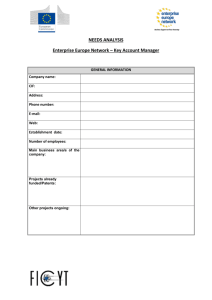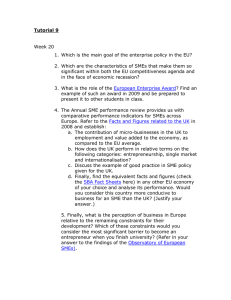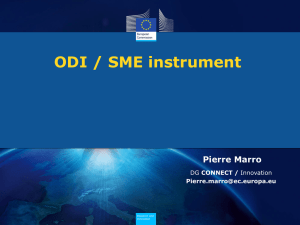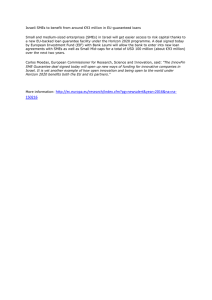Specific provisions and funding rates
advertisement
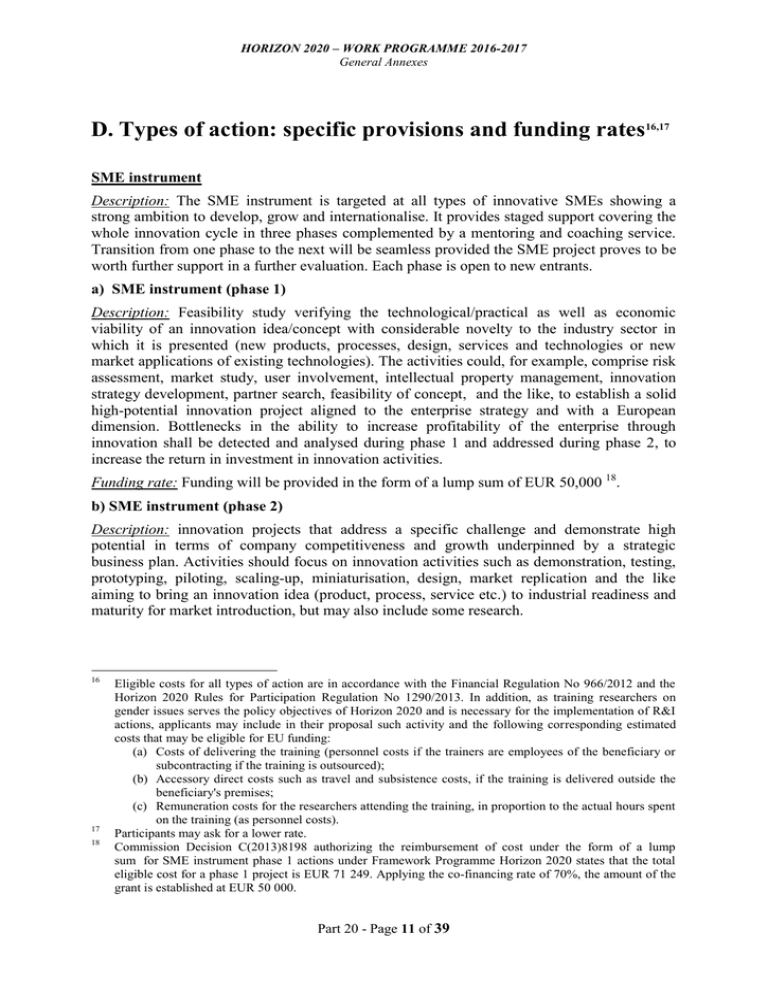
HORIZON 2020 – WORK PROGRAMME 2016-2017 General Annexes D. Types of action: specific provisions and funding rates16,17 SME instrument Description: The SME instrument is targeted at all types of innovative SMEs showing a strong ambition to develop, grow and internationalise. It provides staged support covering the whole innovation cycle in three phases complemented by a mentoring and coaching service. Transition from one phase to the next will be seamless provided the SME project proves to be worth further support in a further evaluation. Each phase is open to new entrants. a) SME instrument (phase 1) Description: Feasibility study verifying the technological/practical as well as economic viability of an innovation idea/concept with considerable novelty to the industry sector in which it is presented (new products, processes, design, services and technologies or new market applications of existing technologies). The activities could, for example, comprise risk assessment, market study, user involvement, intellectual property management, innovation strategy development, partner search, feasibility of concept, and the like, to establish a solid high-potential innovation project aligned to the enterprise strategy and with a European dimension. Bottlenecks in the ability to increase profitability of the enterprise through innovation shall be detected and analysed during phase 1 and addressed during phase 2, to increase the return in investment in innovation activities. Funding rate: Funding will be provided in the form of a lump sum of EUR 50,000 18. b) SME instrument (phase 2) Description: innovation projects that address a specific challenge and demonstrate high potential in terms of company competitiveness and growth underpinned by a strategic business plan. Activities should focus on innovation activities such as demonstration, testing, prototyping, piloting, scaling-up, miniaturisation, design, market replication and the like aiming to bring an innovation idea (product, process, service etc.) to industrial readiness and maturity for market introduction, but may also include some research. 16 17 18 Eligible costs for all types of action are in accordance with the Financial Regulation No 966/2012 and the Horizon 2020 Rules for Participation Regulation No 1290/2013. In addition, as training researchers on gender issues serves the policy objectives of Horizon 2020 and is necessary for the implementation of R&I actions, applicants may include in their proposal such activity and the following corresponding estimated costs that may be eligible for EU funding: (a) Costs of delivering the training (personnel costs if the trainers are employees of the beneficiary or subcontracting if the training is outsourced); (b) Accessory direct costs such as travel and subsistence costs, if the training is delivered outside the beneficiary's premises; (c) Remuneration costs for the researchers attending the training, in proportion to the actual hours spent on the training (as personnel costs). Participants may ask for a lower rate. Commission Decision C(2013)8198 authorizing the reimbursement of cost under the form of a lump sum for SME instrument phase 1 actions under Framework Programme Horizon 2020 states that the total eligible cost for a phase 1 project is EUR 71 249. Applying the co-financing rate of 70%, the amount of the grant is established at EUR 50 000. Part 20 - Page 11 of 39 HORIZON 2020 – WORK PROGRAMME 2016-2017 General Annexes In exceptional circumstances, duly justified by the character of an area, a topic may provide for actions where the research component is strongly present, as an alternative to the innovation actions described above. SMEs can subcontract work and knowledge that is essential for their innovation project in the spirit of the innovation voucher concept. Proposals should be based on a strategic business plan either developed through phase 1 or another means. Funding rate: 70% (exceptionally, 100% where the research component is strongly present). The single applicable rate is specified under the relevant topic. c) SME instrument (phase 3): Support to commercialisation promotes the wider implementation of innovative solutions and customers and supports financing of growth by facilitating access to public and private risk capital. This stage will not provide for direct funding, but SMEs can benefit from indirect support measures and services as well as access to the financial facilities supported under Horizon 2020. d) Mentoring and coaching: Each beneficiary of the SME instrument will be offered business coaching support during Phase 1 (up to 3 coaching days) and Phase 2 (up to 12 coaching days) in addition to the grant offered. This support will be provided through the Enterprise Europe Network (EEN) and delivered by a group of qualified and experienced business coaches. The local EEN office will introduce the beneficiary to the coaching process and propose a selection of coaches from the database managed by the Commission for the beneficiary to choose from. The objective is to accelerate the impact of the support provided through the SME instrument and to equip beneficiaries with the necessary skills, business processes and relevant competencies for long-term growth. Phase 3 does not include individual business coaching, but SME instrument participants will be able to count on continuing EEN support in linking to relevant support services within the Network, regionally or nationally. It is important to note that the objective of coaching is not to support the company in project management or reporting obligations related to Horizon 2020 participation. This stage will not provide for direct funding. Part 20 - Page 12 of 39
